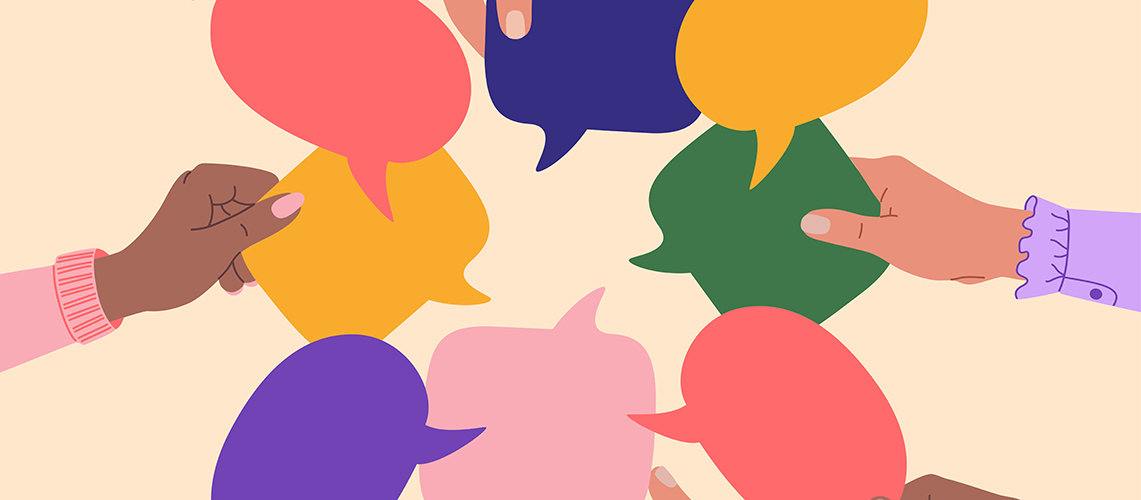 Human hands holding speech bubbles
Human hands holding speech bubblesCo-production is a harmonious dance where service providers, users and stakeholders sway together. It’s not a mere waltz; it’s a vibrant tango of authenticity, in a room filled with diverse voices: researchers, clinicians, and those who’ve weathered the storms of health challenges. They gather, not as passive spectators, but as active creators of knowledge, by gracefully guiding service users with their expertise.
Co-production provides authentic insights, as we are able to step beyond sterile research protocols. Lived experience experts – the true architects of wisdom – join us. Their narratives, sometimes etched with pain, resilience and hope, enrich our understanding; even taking the seemingly mundane or invisible and shining light on hidden embodiment. Quantitative data may sketch the outlines, but their stories (the qualitative data) fill the canvas.
In the spirit of ubuntu, we say, “I am because we are”. Co-production places humanity at the centre of each narrative, an approach that empowers the individual as they find their place within their communities’ history. Health isn’t an abstract concept; it’s the pulse of lives lived. By involving users, we shift from detached theories to compassionate action.
The canvas of arts in health
Now, let’s add hues to our canvas. Arts in health emerges as a sun-kissed meadow – a place where creativity blooms alongside healing. Picture this:
The arts – whether a haunting mbira melody, a brushstroke on canvas or an energetic muchongoyo dance – ripple through our wellbeing. They boost cognition, ease anxiety and mend frayed nerves. From cradle to twilight years, the arts offer a lifetime of health dividends.
Arts in health isn’t confined to galleries or concert halls. It’s about resilience, empathy and community bonds. It’s the rhythm of a drum circle in a hospital corridor, the laughter echoing in an art therapy session, and the mural that whispers hope. Knowing that even the gentle tapping of a hand, the way you walk, the way you breathe is all part of the hidden rhythms we dance to, everyone dances through life… we just don’t always realise it.
Dance movement psychotherapy: our bridge
Now, let’s realise our dancing shoes and step into the spotlight. Dance movement psychotherapy (DMP) – a silent revolution – looks at how our bodies speak. Here’s our choreography:
- Inclusivity and expression: DMP can transcend language barriers and engage in our primal linguistics. Participants understand their stillness, they move, sway, and leap – expressing emotions, histories and identities. It’s a universal dialogue where everybody has a voice and we learn what is it our bodies hold and what are they telling us. Imagine the isithikitsha dancers, their feet grounded yet reaching for the sky.
- Breaking hierarchies: Verbal communication often clasps hierarchies and to the sceptic provides control as they decide what they want to share. DMP untangles those knots. In our circle, everyone – regardless of status or mental capacity – sways equally. From the simple cadence of how someone walks, to one who holds themselves back in the corner, our dance floor knows no privilege. Perhaps we’ll borrow a move from the indlamu warriors – strength and grace intertwined, or we will reach for a developmental endeavour where we can equally be clumsy. Ours will be a dance unique in that we each bring a piece of the puzzle through our differing narratives while our paths cross at this juncture.
Where co-production and arts in health tango
DMP becomes our bridge:
- Co-production: In our studio, we co-create meaning. Participants – researchers, dancers and those who’ve faced illness even life – collaborate. Their movements echo their stories, as intrinsically important as every life.
- Arts in health: DMP marries clinical insights with artistic intuition.
We look forward to seeing you on 24-25 October 2024 for our workshop at the University of Glasgow; we do our own co-production and arts in health tango across the DMP bridge. If you haven’t registered, it isn’t too late.

